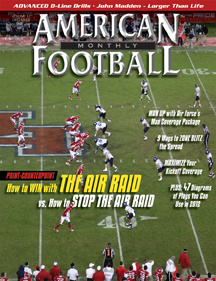Article CategoriesAFM Magazine
|
COACHING FROM THE HEART© More from this issueby Marc Sites, Assistant Coach Liberty High School (CO)
List any great team or dynasty in the history of sports and every team had a great coach. John Wooden at UCLA, Bill Walsh with the 49ers, Phil Jackson with the Bulls and Lakers, Red Auerbach with the Celtics and the list goes on and on. On the flipside, there have been plenty of talented teams in sport that were never champions and many times the culprit for their failure was ineffective coaching or leadership. Thus, coaches can have a significant impact on the fortunes of their teams. All coaches would like to be known as “great” coaches when they hang up their whistle for the last time. What constitutes a “great” coach? Win/loss record, knowledge of X’s a....The full article can only be seen by subscribers.
|
|
|||||||
| HOME |
MAGAZINE |
SUBSCRIBE | ONLINE COLUMNISTS | COACHING VIDEOS |
Copyright 2026, AmericanFootballMonthly.com
All Rights Reserved





